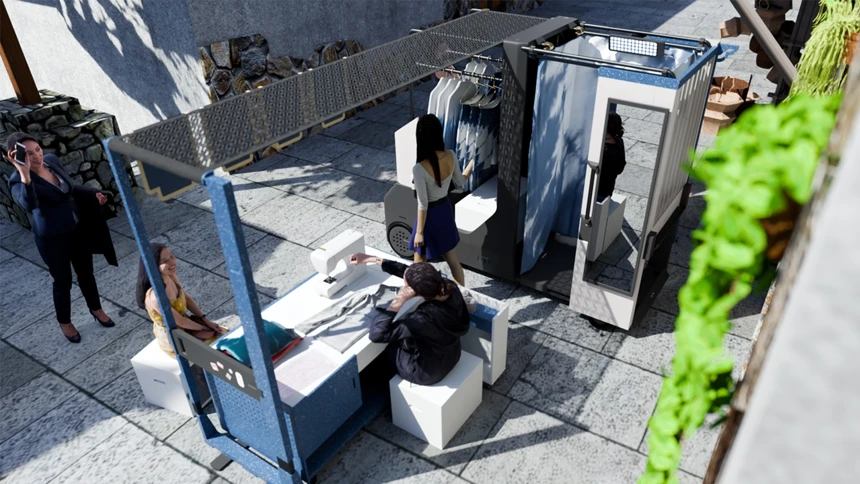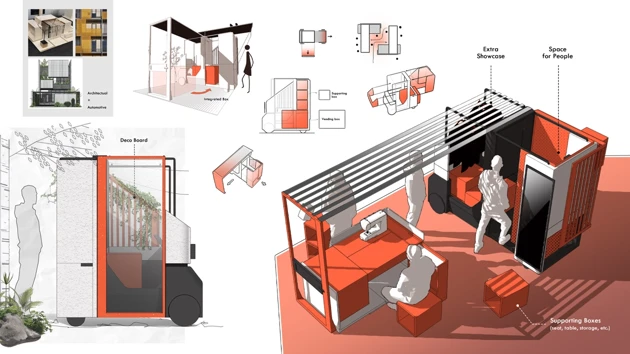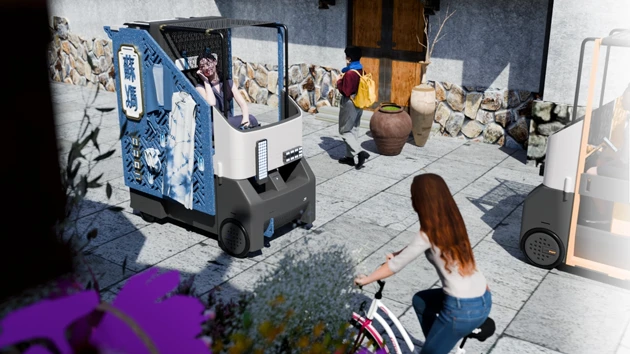The structure an aesthetic of Ziqi An's ideation process.
A Childhood memory reimagined: How one student is reviving China’s vanishing street vendors
Ziqi An remembers the smell first. The smoky aroma of grilled skewers wafting through the air, the clatter of makeshift carts, the chatter of neighbours gathering around a mobile vendor. “The most enjoyable kind of moment,” he says, “was getting a skewer from the local vendor after school.” But those moments are now rare. In China’s rapidly modernising cities, the once-vibrant culture of mobile vending has been pushed to the margins, casualties of urban development and a growing appetite for order.

VendPlay reimagines China’s marginalised mobile vending culture through a modular, community-driven platform.
At UID25, the annual degree exhibition at Umeå Institute of Design, Ziqi An’s project VendPlay offers a bold counter-narrative. It is not just a design proposal. It is a personal mission to restore dignity and visibility to a disappearing way of life.
A modular future for a fragmented past
VendPlay is a modular, community-driven platform that reimagines mobile vending for the year 2030. At its core are adaptable “Box” units – sleek, cost-efficient modules that can be configured for different types of vendors, from street food to traditional textile artisans. These units are designed not only for functionality but also for cultural preservation. One prototype, for instance, is tailored for tie-dye textile vendors, integrating work surfaces and display areas into a compact, mobile form.
Hear Ziqi An, graduate from MFA Transportation Design, talk about his grad project for UID25 exploring how future mobility could revive the culture of street food and mobile vendors.
But VendPlay is more than hardware. It is a systemic design solution that includes service ecosystems, community resource sharing, and brand strategies aimed at elevating the social standing of vendors. “I want to create universal tools for different mobile vendors,” Ziqi An explains, “but also connect them into a self-sustained community.”
From sketches to systems
The project began with extensive field research. Ziqi An interviewed vendors, mapped workflows, and studied the spatial dynamics of informal vending. He explored three distinct vending scenarios, iterating through hand-drawn sketches and 3D models in Blender. The final concept was refined into a physical scale model, a tangible vision of a future where vending is not just tolerated but celebrated.

The design process was deeply iterative, blending architectural thinking with service design and business modelling. “As cities develop, there are demanding needs for upgradation,” Ziqi An says. “But that doesn’t mean we have to lose what makes them human.”
A cultural anchor in a changing city
In many ways, VendPlay is a response to the alienation of modern urban life. Where cities have become more efficient, they have also become more impersonal. Mobile vendors, Ziqi An argues, are not just economic actors. They are cultural anchors. They bring spontaneity, familiarity, and a sense of place to the urban fabric.

A part of Ziqi An's vision is based around contributing towards mobility with a lesser carbon footprint.
By 2030, VendPlay envisions modular vending hubs reactivating public spaces and turning streets into sites of belonging. It is a vision rooted in empathy and shaped by design – a future where the past is not erased but reimagined.
A personal project with global resonance
Though grounded in the context of Chinese cities, VendPlay speaks to broader questions about urban resilience, informal economies, and cultural sustainability. It is a project that bridges the personal and the political, the nostalgic and the futuristic.
For Ziqi An, it all started with a skewer on a street corner. Now, it might just end with a new way of thinking about cities and the people who make them come alive.
